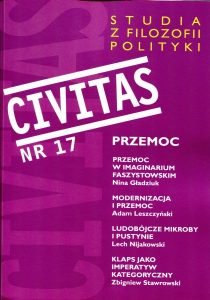Ludobójcze mikroby i pustynie. O latourowskiej pokusie w genocide studies
Genocidal Microbes and Deserts. Latour’s Influences in Genocide Studies
Author(s): Lech M. NijakowskiSubject(s): Political Philosophy, Political history, Political psychology, Inter-Ethnic Relations
Published by: Instytut Studiów Politycznych PAN
Keywords: actor-network theory; genocide studies; historical sociology; genocidal mobilization; genocidal intent; Bruno Latour
Summary/Abstract: The dominant approach in genocide studies focuses on the intentions and motives of mass murderers. However, in many cases, natural phenomena, pathogens and machines determine the nature and course of genocidal mobilization. The aim of this article is to present the advantages of the actor-network theory (ANT) in explaining genocidal mobilization, taking into account environmental factors. “Natural objects” have been selected from a rich catalogue of non-human actors. The author divides these objects into three classes, showing that pathogens (associated with “the asymmetry of resistance” of victims and perpetrators) and deserts are of key importance in the history of collective violence. Referring to specific cases (in particular, the conquest and colonization of the Americas and Australia, the genocide of the Herero and Nama peoples, the Armenian genocide, Shoah), the author identifies that adopting the assumptions and methods of ANT reveals new aspects of the genocidal process. This indicates the need for considering the politics of non-human actors, delegating morality and law, tracking consecutive translations, rejecting the division into qualitatively different micro- and macro-actors, and tracking the emergence of new actants and forms of knowledge during genocide.
Journal: Civitas. Studia z filozofii polityki
- Issue Year: 2015
- Issue No: 17
- Page Range: 59-78
- Page Count: 20
- Language: Polish

